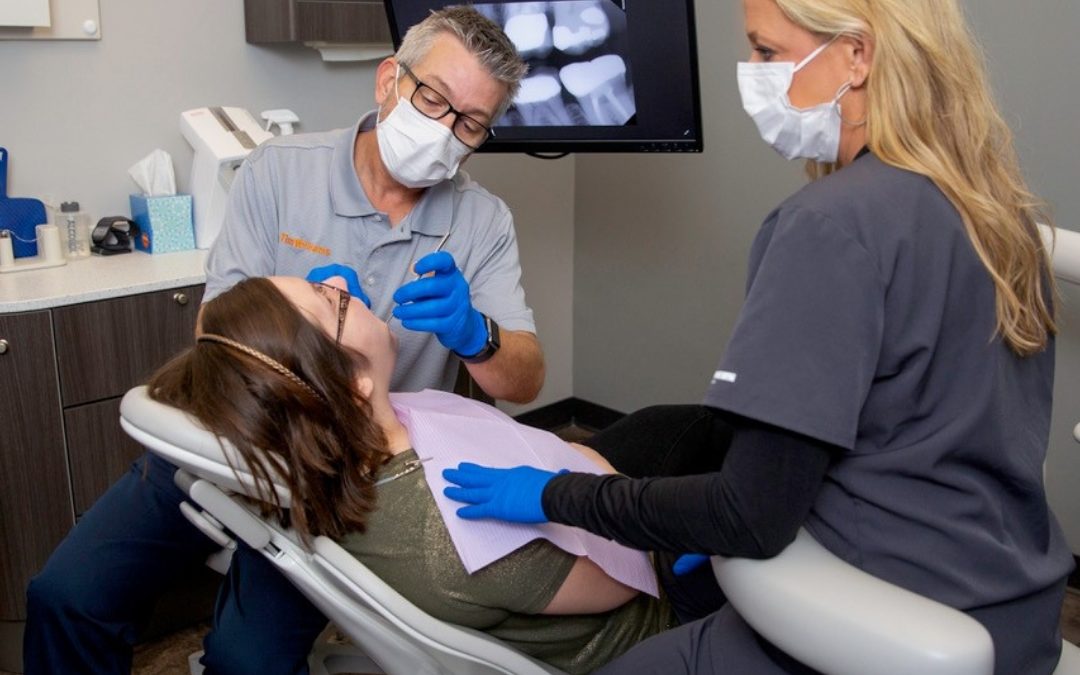According to the Center for Disease Control (CDC), more than 100 million Americans are living with prediabetes or diabetes and represent a growing health concern in the United States. Those with diabetes have the tendency to run a risk of damage to the kidneys, heart, eyes, and other areas of the body. Have you considered what affect diabetes has on your teeth? There are implications for the diabetic patient to be cautious and consistently aware of how to treat teeth.
Diabetes and the Effect on Teeth and Gums
Blood sugar levels directly affect the saliva in your mouth. Elevated levels of glucose occur due to blood sugar levels spiking, which leads to over-production of bacteria in your mouth not washed away easily by saliva. When the bacteria in your mouth combine with the foods that you consume, dental plaque is formed. Dental plaque is a sticky film of bacteria, and if left unchecked over time leads to tartar. Layers of tartar are rough and porous and cause bad breath, gum disease, cavities, and, eventually, tooth decay. If oral health does not improve, you could be looking at a more serious stage of gum disease known as periodontal disease. Symptoms of possible gum disease include red, swollen, or bleeding gums when teeth are brushed. Diabetes can also cause dry mouth syndrome, which has symptoms of mouth pain, mouth sores, cavities, or infections and can also be the cause of thrush, an infection caused by the growth of fungi in the mouth.
Dental Health Suggestions for Diabetic Patients
Diabetes affects more than teeth, and some suggestions we have for caring for teeth in diabetic patients include overall health recommendations. One of the most crucial health concerns is blood sugar level. Ensuring that you have an effective monitoring system for glucose in the body is the first step. Next, studies increasingly show that management of diabetes is dramatically improved by choosing foods that keep blood sugar levels low. Instead of consuming carbohydrates, such as breads, pastas, or processed foods, replace these with whole grains, beans, vegetables, lower fat milk, and fruit. These food choices will keep saliva plentiful, and the mouth from overgrowing bacteria. Next, work to use a mouthwash without alcohol if experiencing dry mouth symptoms, and brush your teeth after every meal. It is recommended to wait at least 30 minutes after a meal before brushing, as tooth enamel has been softened slightly by food acidity. When brushing, choose a toothbrush with soft bristles, and of course, don’t forget to floss daily! If you wear dentures, do not sleep in them and be sure to clean daily. If smoking is a problem, talk to your doctor about ways to quit so that your teeth, gums, and overall health will be improved.
A dentist can offer further suggestions unique to the diabetic condition. When working with a dentist, it is imperative that you let your dental expert know what medications that you take, if you take insulin, and if your blood sugar is off at the time of your visit with the dentist. As always, it is recommended that you visit the dentist twice a year for routine check-ups, although additional visits may be needed depending upon what your dentist recommends.
University General Dentists in Knoxville, TN, Works with Diabetes Patients to Improve Dental Care
Constant research is being conducted to ensure those who suffer from diabetes are able to live productive lives. Keeping up with proper dental care is vital to individuals with diabetes, as the two interconnected. At University General Dentists, our staff cares and wants to meet you where you are in your management of diabetes. Reach out today to see how we can customize a dental plan for you. Our offices can be reached by calling 865-305-9440 or our West Knoxville location at 865-500-5700.

